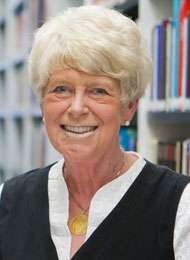Los estudios de ciencias sociales como medio para destapar injusticias en la sociedad
Margaret Archer, profesora del Máster en Investigación en Ciencias Sociales, recordó en el Día Mundial de la Justicia Social algunos retos como la inmigración o la explotación laboral

FOTO: Manuel Castells
Las humanidades y ciencias sociales pueden aportar conocimientos a la sociedad valiosos para la concienciación y el cambio social. Así lo cree Margaret Archer, profesora de Sociología de la Universidad de Warwick, que visitó recientemente la Universidad de Navarra para impartir clase en el Máster en Investigación en Ciencias Sociales. Para ella, la investigación en estas áreas puede demostrar la existencia de problemas sociales y llevarlos a la esfera pública para su debate, como la dureza de las condiciones laborales en algunas fábricas o la inmigración.
Con motivo del Día Mundial de la Justicia Social, subrayó la importancia de investigar sobre el desarrollo de la economía y el diálogo social para conseguir justicia social, aunque también advierte que pueden convertirse en un arma de doble filo. Por ejemplo, la seguridad social fue una medida legal impuesta y permitió a todos tener asistencia sanitaria. Luego, destaca el movimiento de los chalecos amarillos, que sublevó a la población francesa ante la subida de impuestos a los carburantes. “Para los pobres, si tenían el lujo de poseer un coche, estos impuestos suponían una gran parte de sus ingresos”, expone.
Por otro lado, lamenta que tampoco se haya avanzado en el diálogo social para la coexistencia. “El diálogo sobre la igualdad de la mujer ha hecho muchísimo en los últimos treinta años, pero todavía es un asunto por terminar”, aclara.
La injusticia de la inmigraciónUn diálogo aún más estancado y que, para la experta, debe visibilizarse es el de la raza y la inmigración. La socióloga cree que sigue existiendo cierto rechazo por parte de las familias de clase media ante personas de color. Algo que considera que ha saltado a la política: “En lugares como Holanda o Italia se están desarrollado partidos políticos que no son precisamente amigables con personas de otras razas”.
Además, asegura que en Reino Unido, su país natal, la carga de la ayuda a inmigrantes y refugiados recae en voluntarios, ya que el Estado no se responsabiliza y les considera “una carga”. Archer fundó una asociación que rescata a víctimas del tráfico de personas y lo ha vivido muy de cerca: “Cuando se descubre a una víctima de la trata y se reporta a la policía, no tienen derecho ni a quedarse ni a trabajar, ¿cómo se supone que van a sobrevivir entonces?”, lamenta.
Sin embargo, ante movimientos migratorios masivos de hoy en día, Archer considera que el trabajo de los voluntarios no es suficiente y se necesitan acciones a gran escala. La experta afirma que es necesario crear un fondo de financiación donde todos los países de la Unión Europea aporten algo y, así, se evitaría que algunos países, como Grecia, estuvieran desbordados y sin recursos ante la llegada de refugiados. “Si la Unión Europea se considera defensora de la justicia, debe defenderla para todos, a pesar de los posibles inconvenientes”, concluye.
Margaret S. Archer (Reino Unido, 1943) es profesora de Sociología de la Universidad de Warwick, y miembro fundador y actual presidenta de la Pontificia Academia de Ciencias Sociales. Asimismo, fue la primera mujer presidente de la Asociación Internacional de Sociología. Se licenció y doctoró en Sociología por la London School of Economics de la Universidad de Londres y realizó estudios de posgrado en la Universidad de la Sorbona. Ha sido profesora en las universidades de Cambridge, London School of Economics, Universidad de Reading y Universidad de Warwick. En junio de 2019 recibirá el doctorado Honoris Causa por la Universidad de Navarra.
